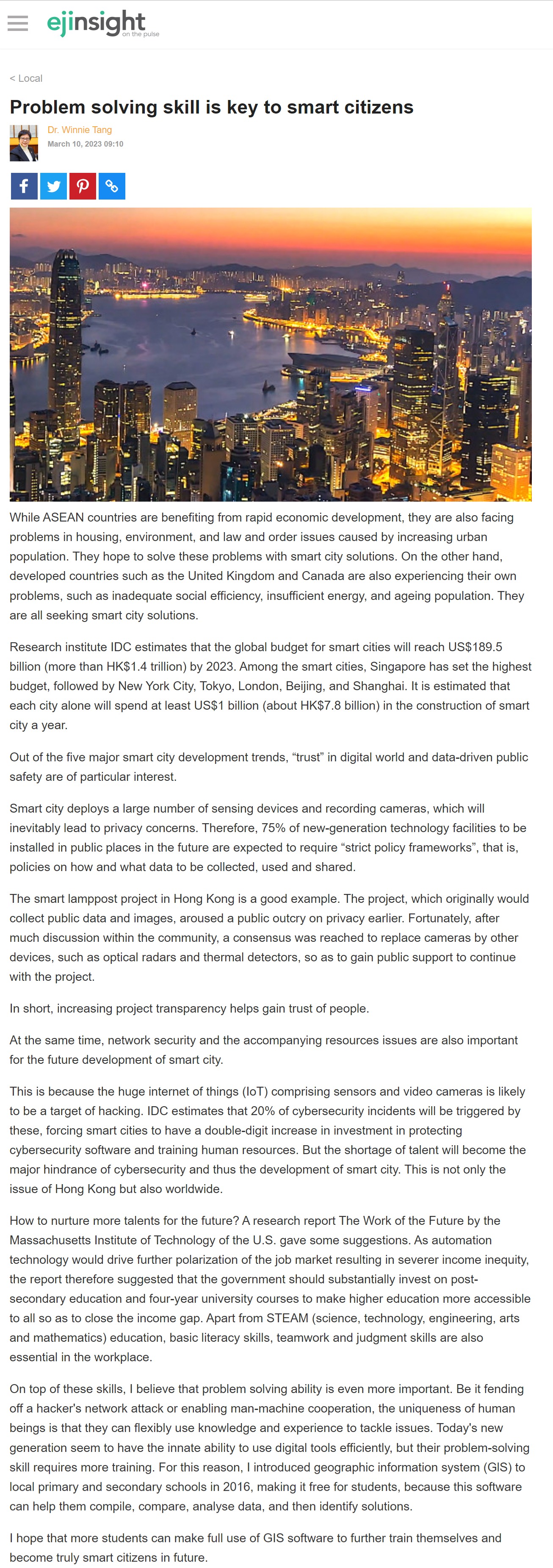網上版請按此

Problem solving skill is key to smart citizens
While ASEAN countries are benefiting from rapid economic development, they are also facing problems in housing, environment, and law and order issues caused by increasing urban population. They hope to solve these problems with smart city solutions. On the other hand, developed countries such as the United Kingdom and Canada are also experiencing their own problems, such as inadequate social efficiency, insufficient energy, and ageing population. They are all seeking smart city solutions.
Research institute IDC estimates that the global budget for smart cities will reach US$189.5 billion (more than HK$1.4 trillion) by 2023. Among the smart cities, Singapore has set the highest budget, followed by New York City, Tokyo, London, Beijing, and Shanghai. It is estimated that each city alone will spend at least US$1 billion (about HK$7.8 billion) in the construction of smart city a year.
Out of the five major smart city development trends, "trust" in digital world and data-driven public safety are of particular interest.
Smart city deploys a large number of sensing devices and recording cameras, which will inevitably lead to privacy concerns. Therefore, 75% of new-generation technology facilities to be installed in public places in the future are expected to require "strict policy frameworks", that is, policies on how and what data to be collected, used and shared.
The smart lamppost project in Hong Kong is a good example. The project, which originally would collect public data and images, aroused a public outcry on privacy earlier. Fortunately, after much discussion within the community, a consensus was reached to replace cameras by other devices, such as optical radars and thermal detectors, so as to gain public support to continue with the project.
In short, increasing project transparency helps gain trust of people.
At the same time, network security and the accompanying resources issues are also important for the future development of smart city.
This is because the huge internet of things (IoT) comprising sensors and video cameras is likely to be a target of hacking. IDC estimates that 20% of cybersecurity incidents will be triggered by these, forcing smart cities to have a double-digit increase in investment in protecting cybersecurity software and training human resources. But the shortage of talent will become the major hindrance of cybersecurity and thus the development of smart city. This is not only the issue of Hong Kong but also worldwide.
How to nurture more talents for the future? A research report The Work of the Future by the Massachusetts Institute of Technology of the U.S. gave some suggestions. As automation technology would drive further polarization of the job market resulting in severer income inequity, the report therefore suggested that the government should substantially invest on post-secondary education and four-year university courses to make higher education more accessible to all so as to close the income gap. Apart from STEAM (science, technology, engineering, arts and mathematics) education, basic literacy skills, teamwork and judgment skills are also essential in the workplace.
On top of these skills, I believe that problem solving ability is even more important. Be it fending off a hacker's network attack or enabling man-machine cooperation, the uniqueness of human beings is that they can flexibly use knowledge and experience to tackle issues. Today's new generation seem to have the innate ability to use digital tools efficiently, but their problem-solving skill requires more training. For this reason, I introduced geographic information system (GlS) to local primary and secondary schools in 2016, making it free for students, because this software can help them compile, compare, analyse data, and then identify solutions.
I hope that more students can make full use of GIS software to further train themselves and become truly smart citizens in future.
Dr. Winnie Tang
Adjunct Professor, Department of Computer Science, Faculty of Engineering; Department of Geography, Faculty of Social Sciences; and Faculty of Architecture, The University of Hong Kong